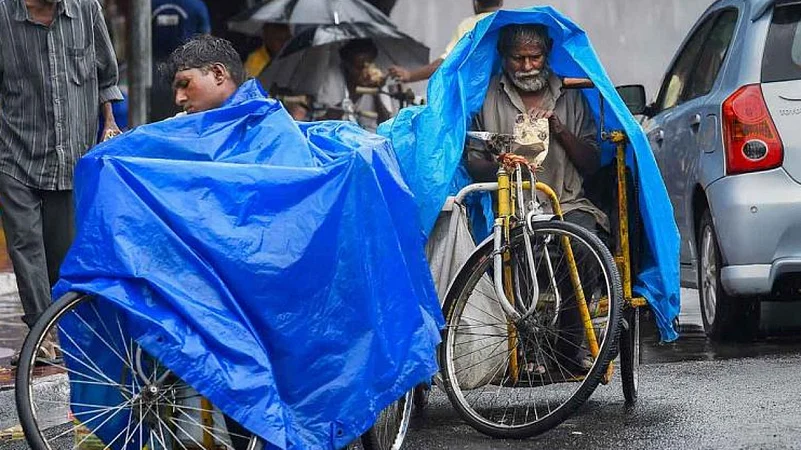A day after the President of India promised “accessibility, equality and a dignified life” for disabled people, adding that it is the country's "collective responsibility as a society" to ensure these rights, persons with disability (PWD) have found themselves disappointed and neglected after Tuesday's Budget 2022-23 announcement. Even with a rise in allocations, activists claim that the Budget has failed to respond to the needs of the disabled community.
Unsatisfactory allocation
The Social Justice and Empowerment Ministry, which caters to the welfare of the backward classes and those with disabilities, was allocated Rs 13,134 crore in the Union Budget 2022-23, a 12 per cent increase from the last fiscal. An amount of Rs 11,922 crore has been allocated for the Department of Social Justice and Empowerment and Rs Rs 1212 crore for the Department of Empowerment of Persons with Disabilities in the financial year 2022-23.
Last year's budget recorded a nearly 12 per cent reduction in allocations to the Department of Empowerment of Persons with Disabilities. Unlike last year, allocations for PWDs has indeed increased, but as per Muralidharan, the General Secretary of the National Platform for the Rights of the Disabled (NPRD), the increase is "marginal".

"Even with the increase, there is a shortfall of Rs. 112.97 crores as compared to the 2020-21 budget estimates. This is so even in the case of the total allocation for the national programmes for the welfare of persons with disabilities, which has seen a shortfall of Rs. 20 crores as compared to 2020-21 estimates. Same also with the National Trust as well as the social security and welfare of persons with disabilities, which too have estimates less than what was allocated in 2020-21."
NPRD has pointed out some of the drastic cuts. For instance, the amount allocated for the Artificial Limbs Manufacturing Corporation of India (ALIMCO) has been drastically from Rs. 50 crore last year to a mere Rs. 0.10 crore this time. ALIMCO manufactures and supplies aids and appliances that the government distributes through various schemes and programmes to help persons with disability. Under the auspices of the PM himself, various record-setting mega distribution camps have been organized.
No jobs or financial assistance
Despite facing hardships through two years of the pandemic, activists noted that the demand for free and universal health coverage for all PWDs was not met. Activists also point out that the Budget has failed to assure any jobs or income security to the "huge army of unemployed disabled" in the country. "The privatization of public sector units and the heavy loss of jobs during the pandemic warranted that allocations to the National Handicapped Finance and Development Corporation be increased considerably, to enable it to provide loans to small businesses set up by disabled people. In the last budget, this was drastically reduced from Rs. 41 crores provisioned in the 2019-20 budget to a mere Rs. 0.01 crore. This time too the figure remains the same," Muralidharan noted.
Disability rights activist and co-founder of Equal Centre For Promotion of Social Justice Meenakshi Balasubramaniam points out that the Budget did not include any enhancement of the disability pension, which has remained a meagre Rs 300 per month for over a decade now. No special packages or relief schemes to ensure jobs for unemployed PWD who lost their jobs in the pandemic.

"It is not only the department for PWD that allocates money. This Indira Gandhi National Disability Pension comes under another department. If you look at the numbers, there is a reduction in allocation there. Given the Covid-19 pandemic, many of us have already lost jobs and are facing marginalization due to inaccessibility, lack of education or employment opportunities, social protection is one of the key sectors that the government needs to focus on to make the PWD feel secure".
No social security
The disability movement has been demanding a cash allowance or a social security benefit which compensates for lack of income and also includes extra benefits and the cost of disability. Families with PWD incur huge additional costs in the form of medical bills, cost of transportation and maintenance. Add to that a lack of income and the family might fail to meet even the most basic needs of an individual. Balasubramaniam, who also works with the Centre For Inclusive Policy, however, points out that one-off cash assistance or increased pension may not be enough to provide social security to PWD."It needs to be a combination of cash assistance and support services such as assisted devices, rehabilitation services, personal assistance services and employment or skilling opportunities where possible,' she said.
Moreover, the design of existing schemes needs to also be altered. The pension scheme, for instance, has design issues such as beneficiaries need to be 18 years and above and not in a capacity to work. It is clearly against a right-based approach, the activist points out. The design flaws also keep the community from receiving the benefits. There are similar flaws in other benefits offered to PWD. The ex gratia of Rs 1000/- announced in 2020, according to the Economic Survey 2022, covered only 2.82 crore beneficiaries. Apart from the disabled, the beneficiaries include widows and senior citizens also.

While activists and persons with disability welcome the move to amend 80DD of the Income Tax Act to allow for the maturity of an insurance policy even while the parent/guardian of the disabled ward is alive, the decision has come three years after the Supreme Court's directions on the same.
"There is no assurance on providing life and other insurance, including for coverage for assistive devices and rehabilitation needs of the disabled. The goals of “accessibility, equality and a dignified life” that President Kovind, so eloquently espoused, stand shattered," Muralidharan said. The National Program for the Welfare of Persons with Disabilities was allocated Rs 635 crore in 2022-23. In 2021-22, an allocation of Rs 584 crore was made.


























